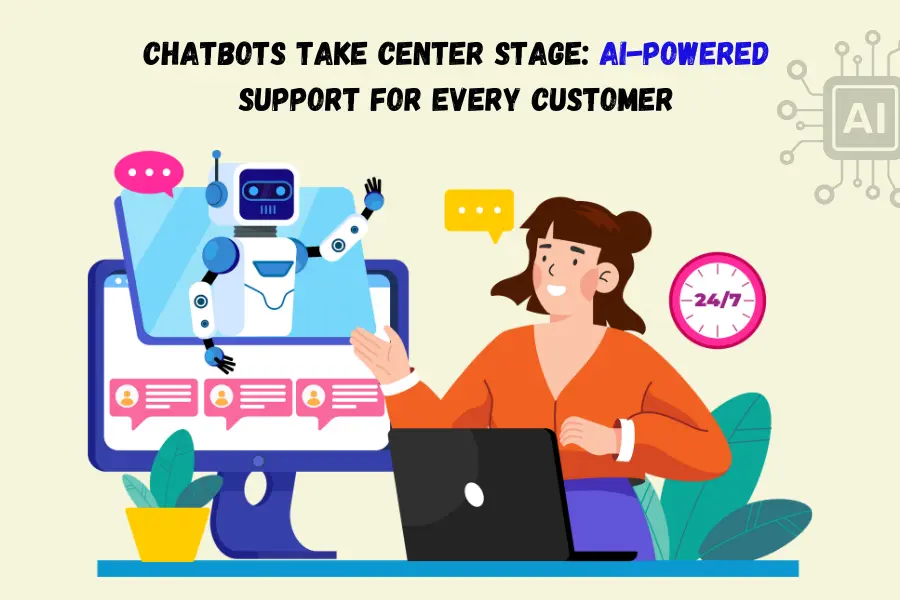AI-Powered Chatbots: Personalized Support Across Multiple Channels
AI-powered chatbots are transforming customer service by providing personalized support across various communication channels. Leveraging artificial intelligence, these chatbots can interact with customers in real-time, delivering instant, accurate, and consistent responses. This article explores the capabilities, benefits, and implementation strategies of AI-powered chatbots, highlighting how they enhance customer support.

Capabilities of AI-Powered Chatbots
- Natural Language Processing (NLP): NLP enables chatbots to understand and interpret human language, allowing them to comprehend customer queries accurately. This technology helps chatbots process both written and spoken language, making interactions more natural and intuitive.
- Machine Learning: Machine learning algorithms allow chatbots to learn from past interactions and improve over time. They can recognize patterns in customer behavior, predict future queries, and provide more accurate responses.
- Contextual Understanding: Advanced AI chatbots can maintain context throughout a conversation, remembering previous interactions and using this information to provide relevant support. This contextual understanding enhances the user experience by making interactions more coherent and personalized.
- Multichannel Integration: AI-powered chatbots can operate across various communication channels, including websites, social media platforms, messaging apps, and mobile applications. This multichannel integration ensures that customers receive consistent support, regardless of how they choose to contact a business.
Benefits of AI-Powered Chatbots
- 24/7 Availability: One of the most significant advantages of AI chatbots is their ability to provide round-the-clock support. Unlike human agents, chatbots can operate without breaks, ensuring that customers receive timely assistance at any hour.
- Instant Responses: AI chatbots can handle multiple queries simultaneously, delivering instant responses. This reduces wait times and enhances customer satisfaction by providing immediate solutions to problems.
- Scalability: AI chatbots can scale effortlessly to accommodate a growing number of queries. Whether a business is experiencing a sudden spike in customer inquiries or is expanding its customer base, chatbots can handle the increased load without compromising service quality.
- Cost Efficiency: By automating routine customer service tasks, chatbots can significantly reduce operational costs. Businesses can allocate human resources to more complex and high-value tasks, optimizing overall productivity.
- Personalization: AI chatbots use data from previous interactions to tailor responses to individual customers. This personalized support helps build stronger customer relationships and improves the overall user experience.
Implementing AI-Powered Chatbots
- Define Objectives: Before implementing a chatbot, it’s essential to define clear objectives. Determine the specific tasks the chatbot will handle, such as answering frequently asked questions, processing orders, or providing technical support.
- Choose the Right Platform: Selecting the appropriate platform is crucial for successful chatbot implementation. Consider factors such as integration capabilities, ease of use, and scalability. Popular platforms include IBM Watson, Google Dialog Flow, and Microsoft Bot Framework.
- Design User-Friendly Interfaces: A user-friendly interface is essential for effective chatbot interactions. Ensure that the chatbot’s interface is intuitive and easy to navigate, providing a seamless user experience.
- Train the Chatbot: Training is a critical step in chatbot development. Use historical customer data to train the chatbot, helping it understand common queries and appropriate responses. Continuous training and updates are necessary to keep the chatbot accurate and relevant.
- Monitor and Optimize: After deployment, continuously monitor the chatbot’s performance. Use analytics to track key metrics such as response accuracy, resolution times, and customer satisfaction. Regularly update the chatbot based on feedback and performance data to ensure it remains effective.
Use Cases of AI-Powered Chatbots
- Customer Support: AI chatbots can handle a wide range of customer support tasks, from answering simple queries to troubleshooting technical issues. This frees up human agents to focus on more complex problems.
- E-Commerce: Chatbots can assist customers with product recommendations, order tracking, and payment processing. Personalized recommendations based on browsing history and preferences can enhance the shopping experience and increase sales.
- Healthcare: In healthcare, chatbots can provide information about symptoms, schedule appointments, and send medication reminders. This improves patient engagement and access to care.
- Finance: Financial institutions use chatbots to assist with account inquiries, transaction history, and fraud detection. Chatbots can also provide personalized financial advice based on user data.
AI-powered chatbots are revolutionizing customer support by offering personalized, real-time assistance across multiple channels. Their capabilities, including natural language processing, machine learning, and contextual understanding, enable them to provide efficient and effective support. The benefits of AI chatbots, such as 24/7 availability, instant responses, scalability, and cost efficiency, make them an invaluable tool for businesses. Implementing AI chatbots involves defining objectives, choosing the right platform, designing user-friendly interfaces, training the chatbot, and continuous monitoring. With their broad range of applications, AI-powered chatbots are set to become a staple in customer service strategies, driving enhanced customer satisfaction and operational efficiency.
Active Events
3 Essential Projects to Elevate Your 5c of Content Marketing Portfolio
Date: Feburary 25, 2025 | 7:00 PM(IST)
7:00 PM(IST) - 8:10 PM(IST)
2432 people have registered
Laying the Groundwork: Python Programming and Data Analytics Fundamentals
Date: Feburary 26, 2025 | 7:00 Pm
7:00 Pm - 8:00 Pm
2811 people have registered
Bootcamps
Digital Marketing Bootcamp
- Duration:4 Months
- Start Date:Feb 9, 2025
Data Analyst Bootcamp
- Duration:4 Months
- Start Date:Feb 9, 2025
